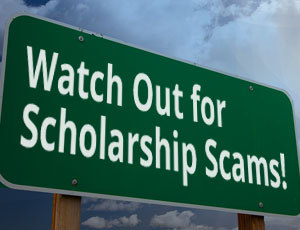Tips to help you navigate the scholarship process
Criteria, amounts and application processes for scholarships vary depending on the scholarship.
Awards can be based on merit, financial need, program of study or other factors as determined by the donor.
Get organized
- Apply for every scholarship for which you are eligible
- Prepare NOW for essays and letters of recommendation (see below)
- Communicate NOW with potential references
- Create a clear and professional scholarship e-mail address
- We recommend you complete the FAFSA, even if you don't think you will qualify for financial aid
Searching for scholarships
- Research! Research! Research!
- Look for local, college, state and employer scholarships
- Look at websites for local colleges
- Local to the student and local to the college you will be attending
- A scholarship funder may notify one school in their area but not all schools
- Check with professional associations
- Scholarship search engines
- Complete a profile for each and be sent opportunities that fit your situation
- Will create a lot of spam emails
- Forward those you are interested in to your personal email
- Revisit often and keep your information current
- Be aware of scholarship scams!
- Read the fine print and understand all terms and conditions before accepting any award
- Never provide confidential or personally identifiable information (PII), such as an SSN until you have been awarded a scholarship
- Check the privacy policy of scholarship websites to make sure your information is protected
- Other potential scholarship scams
- Don't let an essay or letter of recommendation requirement stop you!
Application process
- Read the application criteria carefully to be sure you qualify to apply
- Set aside ample time to complete applications
- Prepare and be thorough in completing applications
- Pay attention to grammar, punctuation, spelling, etc.
- Ask someone else to review prior to submission
- Keep an online or printed copy of every application in case you need it later
- Track application deadlines, submission dates and notification dates
Essays & Letters of Recommendation
- Prepare answers to the following prompts, making sure to include specific examples
- Describe your education and career goals
- Describe your academic successes
- Describe your community service, extracurricular activities and/or workplace accomplishments
- Name a difficult situation you had to overcome and what you learned from it
- Use these answers as the basis for most essay questions and to give to writers of recommendation letters
- Essays
- Essays are your way for the reviewer to get to know you
- Make sure re-used essays are tailored to individual questions
- Minimum/maximum length
- Remove references to other institutions or scholarships
- Letters of Recommendation
- Give the writer the full information they need
- Submission information - does the letter go to you or directly to the scholarship provider?
- Are there specific questions they need to answer?
- Deadline date - give the writer plenty of time
- The best recommendation letters include information regarding all of the prompts listed above
- Give the writer the full information they need
What else do I need to know?
- Write a Thank You Note when you are awarded a scholarship (see below)
- Follow the guidelines to keep or renew the funds
- Enrollment in a certain class
- Minimum enrollment (at least half-time, etc.)
- GPA
- Specific program of study
- Most scholarships do not require repayment
- A few require repayment if the student does not meet the donor requirements (teaching for a certain period of time after obtaining a degree, etc.)
How to Write a Thank You Letter
Scholarship donors are generous and caring people who unselfishly give to support the educational endeavors of students like you. They typically ask for nothing in return, but receiving a well-written thank you letter lets the donor know that his or her scholarship was greatly appreciated. Your letter reminds them why they gave in the first place and often helps secure continuing gifts for future students.
Review these tips and our sample thank you letter to help you compose your own letter in a professional business format. Make sure your letter is free of both grammatical and spelling errors.
Thank you note tips
- Write clearly and concisely
- Double-check for typos and grammatical errors
- Be sincere
- Express enthusiasm
- Send in typewritten, business format
- Use quality paper


